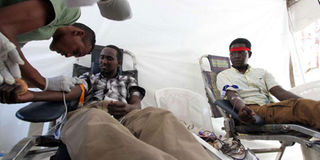Eastleigh residents mobilise to help Somalia blast victims

Eastleigh, Nairobi County, residents donate blood on October 17, 2017 in aid of Mogadishu truck bomb victims. PHOTO | EVANS HABIL | NATION MEDIA GROUP
What you need to know:
- By Tuesday, the government had sent 11 tonnes of medicines to Mogadishu.
- The attack has so far claimed more than 300 lives, though the figure could rise as scores are still missing.
“Fire! Fire!” is the answer one gets after asking Omar Mohamed what he remembers about the Saturday bomb blast in Mogadishu.
In halting English, the 57-year-old teacher describes hearing a bang, and then being thrown backwards “as the area was consumed in flames”.
He regained consciousness hours later in hospital.
Mohamed was among the first casualties flown to Kenyatta National Hospital, Nairobi, on Tuesday.
CASUALTIES
His right leg was badly injured in the blast.
On the bed next to him is 23-year-old Abshir Mohamed Farah, also nursing leg injuries.
He looks frail and throws up moments after he is fed on fruit salad.
Farah, a receptionist at a hotel, was on duty when the bomb went off.
He does not remember much, apart from the explosion and screams.
RECOVERY
Images taken immediately after the blast show flattened buildings, flaming skeletons of vehicles and thick clouds of smoke and dust, with bloodied people being helped to safety.
KNH admitted seven blast victims on Tuesday, with a top official saying the hospital was ready to take in more if need arose.
Kenya’s Defence Ministry said 24 more victims would be treated but it is not clear when they will be flown to Nairobi.
“Most of those admitted to hospital have fractures and soft tissue injuries. They are still being assessed to determine if they require surgery,” KNH communications head Simon Ithae told journalists.
RED CROSS
Long queues were building around Sunrise Mall in Eastleigh Estate on Tuesday morning as hundreds volunteered to donate blood for survivors fighting for their lives in Somali hospitals.
The blood donation was part of a Kenyans for Somalia drive started by the Red Cross and the government to mobilise money, food, medicine and other emergency supplies.
By Tuesday, the government had sent 11 tonnes of medicines to Mogadishu.
HUMANITARIANS
Among the blood donors was Faisal Abdisalam.
“I know some of those who were affected as I used to live near the scene of the explosion just two years ago. I want to support victims of the heinous attack,” he said.
Abdifatah Nadhir, another blood donor, said the attack deeply affected Eastleigh residents “because some of our relatives and friends were killed or maimed.
“I’m helping people I may have known, so I will donate blood,” he told the Nation.
SHABAAB
Ahmed Mohamed, one of those who mobilised the community, said the target was 400 pints of blood, “which will be flown to Somalia by today” (Friday).
“We are deeply hurt because those injured are our brothers and sisters,” he said.
According to Fardowsa Jama, another organiser of the campaign, the attack showed “Somalis are not villains, but also victims caught in the grip of terrorism perpetuated by Al-Shabaab”.
“The world thinks Somalia and terrorism are synonymous. But our people have been targeted and it is good that we support the victims and collectively fight terrorism,” she said.
TERRORISM
The attack has so far claimed more than 300 lives, though the figure could rise as scores are still missing.
More than 500 others were injured.
However, no one has claimed responsibility for the attack.






